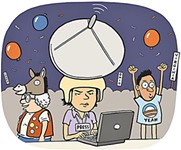The End of the Line?
As print media money dries up, political cartoonists look to the web
By Dan Solomon, Fri., July 13, 2012
Jen Sorensen, the political cartoonist whose strip has been appearing every other week in The Austin Chronicle since May 2011, moved to Austin from Portland in June. She picked Austin for a few reasons – "My natural habitat is living in a progressive Southern college town surrounded by a red state," she says, having previously clocked time in Charlottesville, Va. She cites "a nice cartoonist community here" that she hopes to get involved with ("You're alone at home a lot," she says of her profession, "so it's good for your mental health to get drinks with other cartoonists") and, despite having pulled in shortly before a recent spate of 100-plus degree days, she says that she's "digging the summer weather." Her parents live in Athens, Ga., her husband works as a travelling professor, and her chosen career places few restrictions on where she can work – anywhere with ink, Wi-Fi, and a flat surface to draw on will suffice. In short, as a political cartoonist, Sorensen can do what she does anywhere.
But as budgets shrink and page counts dwindle in the alt-weeklies that have nurtured the brand of alternative political cartooning that Sorensen has built her career on – think work like Tom Tomorrow's This Modern World or Keith Knight's The K Chronicles – the future of the form is in doubt. Sorensen is lucky to be able to make a living doing what she does anywhere. But will the next generation of political cartoonists be able to make a living doing what she does anywhere?
The important thing to remember about political cartooning is that it's an old art form, long predating its cousins: the American comic strip (which dates back to the 1890s) and the comic book (which was conceived as an original entity in the 1930s). Political cartoons have been a vital and essential part of our national dialogue since before there was a nation to dialogue about. You can trace the form's origins in this country from Ben Franklin's "Join, or Die" cartoon from 1754, through the Civil War-era work of Thomas Nast in Harper's (where he first represented Republicans as elephants and Democrats as donkeys) to the establishment of the Pulitzer Prize for Editorial Cartooning in 1922, to its contemporary form, having devoured all of the above as well as sequential comics like Doonesbury and the apolitical work of artists like Robert Crumb. The result has been a medium that's relevant to the interests and tastes of a contemporary audience who hungers for its political news to be served with a heaping serving of ironic detachment. A medium that's vibrant, vital, smart, funny-as-shit – and dying out.
"When you look at The Daily Show or The Colbert Report, what they're doing, really, is political cartoons," Sorensen says. "There's a tremendous appetite for political humor, so it doesn't make sense to us – why would papers cut their comics?"
The answer is multifold – this is a down economy, print publications face threats from a number of online entities, ad revenues have been consistently down since the advent of Craigslist, etc. Tom Tomorrow (real name Dan Perkins), whose strip, This Modern World, debuted in alt-weeklies in 1987, also blames the consolidation of those papers by companies like the Phoenix-based Village Voice Media and Nashville's SouthComm, Inc. for the shrinking opportunities for political cartoonists in print.
"Papers decide to cut the cartoons as a budgetary measure, but it's not actually about saving money," Perkins says. "It's about looking like you're saving money. It's about showing the people at the corporate headquarters that you're doing something, because it's an easy thing to do."
For Perkins – who has been a witness to the rise and growth of the alt-weekly and the cartooning form that rose up alongside of the publications, as well as the uncertainty that both currently face – this amounts to a betrayal that may well have doomed the art form.
"So many of the alt-weeklies are no longer supporting the art form of alt-weekly cartooning," Perkins says. "When I was in the position that Jen Sorensen is in now, there were a bunch of us, and a bunch of younger people. Now, anyone who would consider doing it looks at the fact that the papers are all decimating their comics section, and there's no room for breaking in."
Perkins has never been shy about calling out injustices he spots in This Modern World, and when he talks about the future of alternative political cartooning, he trains that same talent for articulating his indignation on the papers. "This form of cartooning grew up in the alt-weeklies specifically to run in them," he says. "It helped them establish their identities. Now, in a lot of cases, it's been tossed in the garbage can by those same alt-weeklies. If that doesn't turn around, I think this art form ends when Jen Sorensen and [Idiot Box cartoonist] Matt Bors step away from it. When it comes time to decide who murdered the alt-weekly cartoon, you don't need to look any harder than the papers that stopped running them."
It's easy to portray the future of political cartooning exclusively as one of doom and gloom, but there's also opportunity on the horizon. And it comes, perhaps not coincidentally, from the same force that threatens the existence of print media – the all-consuming Internet.
For Sorensen, whose strip grew in the alt-weekly boom of the early-Aughts ("When I started, it seemed like this growth industry – the alt-weeklies were the future of the news," she says), and is still primarily print-based, there are new opportunities that come with publishing her work online.
In the spring of 2011, spearheaded by Tom Tomorrow, the dominant left-leaning political blog Daily Kos launched a political cartoons section. Sorensen was one of the first cartoonists Perkins brought in. "She was at the top of my list," he says, "She's been one of my favorites for a long time." The site's readers seem to agree – Sorensen's strips routinely receive hundreds of Facebook "likes" and thousands of shares on various social media networks.
A four-page strip she did for Kaiser Health networks, republished on Daily Kos, about the Supreme Court's then-upcoming ruling on the Affordable Care Act, went viral in early June, and there's a new immediacy to working online that Sorensen experienced as a result. "That was the most popular thing I've ever done. I couldn't believe the response to it. It was overwhelming," she gushes. Working online, she says, "makes you feel less like you're working in a vacuum. I used to visualize it as putting a message in a bottle. You know someone's reading the message, but you don't necessarily see them at the receiving end. But now, it seems like the feedback comes from ten different places – on Facebook, on Tumblr. It's nice to know that your work's being read."
Sorensen says that she always received her share of feedback – especially hate mail during the Bush years – but the Daily Kos comics page has done more than just offer her more immediate affirmation that people are reading. "They're trying very hard to carry our genre into the new millennium," she says. "It started a little over a year ago. Markos [Moulitsas Zúniga], the founder of the site, is a big fan of alternative comics, and he was aware of the problem that these papers were kind of shrinking."
Sorensen says that Daily Kos pays "very well," and while there are concerns that syndication online may not prove to be as viable as in print ("With print, you've got very discrete markets, and it doesn't matter if you're in two different cities. With websites, people get a little sensitive," she says), migrating to the web – and finding paying outlets there – is going to be a big part of the future survival of the medium.
It's too early to really declare that the Internet is the future of political cartooning. The Internet's been the future of a lot of things, and people have long struggled to actually get paid for doing them online. But whether print cartoons make a resurgence or other outlets start replicating the Daily Kos project, one thing is for sure – the future of political cartooning is probably not going to be easy. And that means that the future, for the cartoonists who choose it as their career, is probably going to look a lot like the past.
"I guess maybe you need to be a certain kind of masochist to be a political cartoonist," Sorensen says. "Dealing with depressing political situations, facing an uphill battle economically, the relentless deadlines – one thing I always say is that political cartooning doesn't pay well financially, but it pays well existentially."
Check out Jen Sorensen's work every other week on our Comix page in the print edition of The Austin Chronicle . For a daily dose, visit www.slowpokecomics.com.











